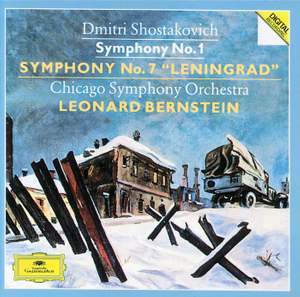Offer,Shostakovich: Symphonies Nos. 1 & 7
Chicago Symphony Orchestra, Leonard Bernstein
The Leningrad Symphony was composed in haste as the Nazis sieged and bombarded the city (in 1941). It caused an immediate sensation, but posterity has been less enthusiastic. What business has... — More…
Downloads
What are FLAC and MP3?Contents
Shostakovich: Symphony No. 1 in F minor, Op. 10
Work length34:37
$4.40
$6.00
- Chicago Symphony Orchestra
- Leonard Bernstein
- Recorded: 1988-06-23
- Recording Venue: Symphony Hall, Chicago
I. Allegretto – Allegro non troppo
Track length8:54
$1.10
$1.50
II. Allegro – Meno mosso
Track length4:47
$1.10
$1.50
III. Lento – Largo – Lento –
Track length10:19
$1.10
$1.50
IV. Allegro molto – Lento – Allegro molto – Meno mosso
Track length10:37
$1.10
$1.50
Shostakovich: Symphony No. 7 in C major, Op. 60 'Leningrad'
Work length1:24:49
$4.40
$6.00
- Chicago Symphony Orchestra
- Leonard Bernstein
- Recorded: 1988-06-23
- Recording Venue: Symphony Hall, Chicago
I. Allegretto
Track length31:43
$1.10
$1.50
II. Moderato. Poco allegretto
Track length14:50
$1.10
$1.50
III. Adagio
Track length19:25
$1.10
$1.50
IV. Allegro non troppo
Track length18:51
$1.10
$1.50






